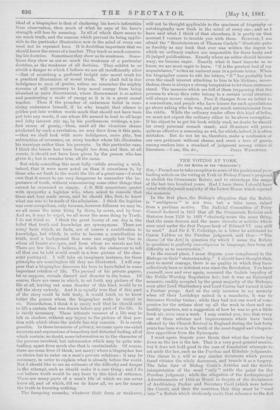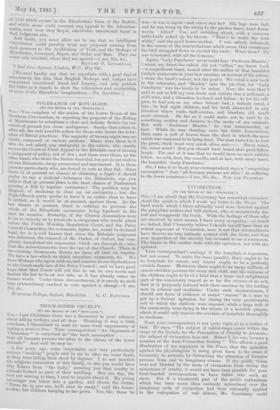THE VOTING AT YORK.
[TO THE EDITOR OF THE n SPECTATOR:1
Sra,—Permit me to take exception to some of the positions of your- leading article on the voting at York on Bishop Fraser's proposa to abolish the Ornaments Rubric, and to stereotype the usage of the last two hundred years. Had I been there, I should have voted svitIrthe:sniall majority of the Lower House which rejected' the measure.
In the first place, the Bishop's allegation that the Rubric' is " ambiguous " is not true, but a false issue, raised' from a partisan motive. The Judicial Committee of Privy Council declared in 1857 that all the Ornaments Rubrics and' Statutes from 1559 to 1661 "obviously mean the same thing,.. that the same dresses and the same utensils or articles which were used under the first Prayer-book of Edward VI. may still' be used." And Sir J. T. Coleridge, in a letter he addressed to• Canon Liddon on the Purchas judgment, said thus :—" The. clause [of the Act] in question (by which I mean the Rubric in question) is perfectly unambiguous in language, free from all. difficulty as to construction."
In the second place, I must dispute your compliment to the Bishops on their " statesmanship." I should have thought that next to moral courage, there is no quality in which they have collectively been so deficient ever since the Revolution. You have• yourself, over and over again, censured the foolish impolicy of the Public Worship Regulation Act ; but it was an Episcopal' measure, readily accepted by the great majority of the Bishops,. even after Lord Shaftesbury and Lord Cairns had turned it into a Puritan purge. And on the only occasion in my memory when all their Lordships united in a manifesto, it was to denounce Sunday trains ; while they had not one word of com- passion for the artisan shut up all the week in close and un- healthy quarters, nor a suggestion of how he was to get a little• fresh air, even once a week. I may remind you, too, that every one of those reforms and improvements which have been effected by the Church Revival iu England during the last forty- years has been won in the teeth of the most dogged and vitupera- tive opposition from the Episcopate.
I must again dispute your thesis that what the Courts lay down as the law is the law. That is a very good general maxim, but it does not hold good in the case of fraudulent attempts to set aside the law, such as the Purchas and Ridsdale judgments.. One clause in a will or any similar document which proves fraud vitiates the whole document, and brands it as a forgery. The false date of Bishop Cosin's Articles and the double interpretation of the word " only " settle the point for the Purchas judgment; while the allegation of the Archiepiscopal' Advertisements of 1564 as Royal, in despite of the disclaimers. of Archbishop Parker and Secretary Cecil (which were before.
the Court), and then the assertion that they must be " read' into " a Rubric which studiously omits that reference to the Act
of 1559 which occurs in the Elizabethan form of the Rubric, and which alone could warrant any appeal to the Advertise- ments, even were they Royal, establishes intentional fraud in that judgment also.
And lastly, you must allow me to say that no intelligent Churchman could possibly trust any proposal coming from such sponsors as the Archbishop of York, and the Bishops of Manchester, Liverpool, Ripon, and Sodor and Man. They can mean only mischief, when they are agreed.—I am, Sir, &C., Ric Haan F. LrrmanALE. 9 Red Lion Sguare, London, W.C., May 8th.
[We need hardly say that we repudiate with a good deal of amusement the idea that English Bishops and Judges have committed intentional fraud and forgery, and only publish the letter as it stands to show the vehemeuce and excitability of some of the Ritualists' imaginations.—Em Spectator.]







































 Previous page
Previous page